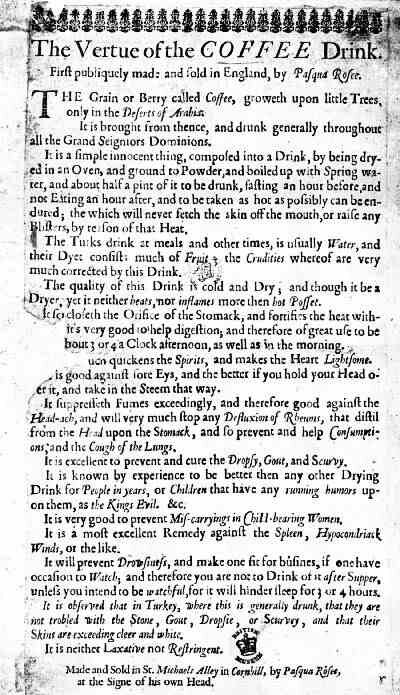A Dark and Bitter World

Plenty of things in medieval fantasy are frightening, but few things fill the modern soul with greater terror than the thought of a world without coffee.
Plenty of things in medieval fantasy are frightening – vampires and werewolves stalking the night, wicked nobility crushing helpless serfs, plague running rampant and early death an accepted part of life – but few things fill the modern soul with greater terror than the thought of a world without coffee.
Much like chocolate, coffee is a relatively recent discovery as far as European civilizations are concerned. Caffeine in general has been a part of human culture on both sides of the Atlantic about as far back as we have records; the Chinese brewed tea more than five thousand years ago, while the Mesoamericans had cocoa and other caffeinated beverages hundreds of years before Socrates ever dreamed of calling people by insulting nicknames. It was, however, probably basically unknown in the eras which our games are based on; no English kings ever went to war to capture coffee fields and no armadas ever brought shipfuls of coffee beans across the ocean from the New World while fending off pirates. (I find this last part particularly disappointing, just because I grew up listening to an old Bob Newhart routine about Sir Walter Raleigh bringing tobacco and coffee to Europe and it’s hard to accept that perhaps Newhart’s comedy wasn’t extensively researched and completely historically accurate).
Coffee was known in the middle ages, however, in Africa and the Middle East, where its use likely goes back to the days of Robin Hood and Richard the Lionhearted, although evidence of brewed coffee appears only around the 15th and 16th centuries. Interestingly, much like chocolate, the earliest use of coffee may have been in religious rituals, which would be consistent with how many other stimulating and intoxicating substances initially have spiritual and metaphysical uses and connotations. A brief Google search actually turns up the legend of Omar, who accidentally brewed history’s first cup of coffee and was given Islam’s equivalent of sainthood in recognition (although when I dug up some less Westernized Sufi sources I couldn’t find records of this legend, so I wonder if it’s a more modern invention). What is known is that, one way or another, coffee was first recorded and described in the records of Sufi monasteries, where they were used to give monks the fortitude to maintain devotions and meditations late into the night. As it became more widely used outside of religious contexts, coffee spread from the Arabic world over the course of centuries, reaching the Ottoman Empire and, through them, Europe, and then the American continents. Records indicate that Italian and other European physicians played a major role in its spread, as they argued that it had endless health benefits, many of which were entirely false. Several Christian churches apparently banned coffee at one time or another over this period on the grounds that it was an invention of the heathens, but as is often the case in matters of enlightened self-interest, once the religious and political leaders tried it and felt the effects, they rapidly softened their views and decided that maybe it should be allowed.
One can only imagine whether the history of Europe would have been less bloody, or more, if kings and popes had had access to coffee… I can see it going either way, depending what times of day most wars and crusades got declared.
Coffee has some interesting potential effects on a campaign setting, if it’s known to exist. Above and beyond the story opportunities that surround any valuable trade good being introduced to new lands, coffee’s role as a religious tool make it an ideal MacGuffin to drive mystic quests and international strife alike. As a powerful stimulant, coffee also has potentially interesting game uses. Does drinking a cup of coffee improve a wizard’s ability to quickly memorize new spells? Could a party cleric use it to enhance prayers and thereby earn special bonuses from their deity, or would a more puritan cleric be violently opposed to this mind-altering substance? And if the Mayans had a god who simultaneously held the portfolios of Chocolate and Warfare, then in a medieval fantasy world, where even the best and brightest of gods tend to be emotionally unstable and prone to over-reaction, the dramatic (and/or comedic) potential of the god of Coffee is tremendous.
Dr. Eris Lis, M.D., is a physician, gamer, and author of the Skirmisher Publishing LLC OGL sourcebook Insults & Injuries, which is also available for the Pathfinder RPG system. More than four years ago he began writing a series of brilliant and informative posts on RPGs through the eyes of a medical professional, and this is the one that appeared here on August 1, 2015.






